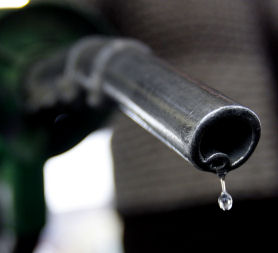Petrol price rise will ‘slow economy’
Petrol prices are predicted to reach an average of 136p a litre by Easter. One transport group tells Channel 4 News that rising prices at the pumps risk slowing down the economy at difficult time.

The Government has again been urged to scrap the planned fuel duty rises amid fears that prices at the pumps will soar by April.
Brian Madderson, chairman of the Retail Motor Industry Federation‘s petrol division, urged Chancellor George Osborne to “halt the relentless rise in fuel prices”.
In a letter to Mr Osborne, Mr Madderson said average petrol prices were already at 128p a litre with diesel close to its record-high of 133p a litre.
On diesel, Mr Madderson said: “We anticipate a new high within days and expect the price to reach 140p a litre from 1 April.”
He went on: “Our unequivocal recommendation is that the Government now abandon the fuel duty ‘escalator’ principle as this is a legacy of your predecessors.
“We anticipate a new high within days and expect the price to reach 140p a litre from 1 April.” Retail Motor Industry Federation’s prediction on diesel prices
“We are mindful that the plan to increase duty yet again by 1p a litre in ‘real terms’ from April 1 will add a further 4-5p a litre to the retail price at the pumps for all grades of fuel.”
Mr Madderson said that by Easter average petrol prices could be as high as 136p a litre, with diesel at “an unthinkable” 140p.
He told Mr Osborne: “We lament the fact that neither you nor your Ministers or officials have yet involved industry in any of its changes to taxation directly affecting road fuel pricing.
“However, we remain willing and available to discuss these serious issues at any time.”
Fair fuel stabiliser
The Road Haulage Association (RHA) is again urging the Government to introduce a “fair fuel stabiliser”.
That would mean a cut in fuel duty when oil prices rise and vice-versa.
RHA Chief Executive Geoff Dunning told Channel 4 News the effects of higher pump prices were far reaching: “Operating costs go up for the haulage industry so prices go up for our customers who are producing the goods that people buy.
“Businesses are already under pressure and rising prices threaten their future.
“That could slow the economy down when we’re in a difficult economic situation.”
Read more: Faisal Islam asks whether David Cameron has read the OBR's response to the fair fuel stabiliser?
Speaking at a press conference today the Prime Minister described the idea of a fuel stabiliser as “attractive”.
David Cameron said “I understand for people who are filling up the family car..when it hits 130p a litre and more it is incredibly painful.
“I do think there’s a very attractive idea that as oil prices rise..there is a way of sharing the pain between the motorist and the Treasury.” David Cameron
“I do think there’s a very attractive idea that as oil prices rise, as the Treasury potentially benefits from revenue both through the North Sea and the petrol pumps there is a way of sharing the pain between the motorist and the Treasury.
“We have to look very carefully at exactly how much more revenue that does mean for the Treasury and what the effect is of higher oil prices but we should look at this and try and find a way of helping people.
“That is exactly what the Chancellor and the Treasury are doing, that is what they’re looking at and there is a Budget in March when those sorts of decisions can be looked at.”
Pressure from Scotland
In Scotland, the First Minister, Alex Salmond, called on the Westminster Government to use some of what he called “the £1 billion of extra revenues from rising oil prices” to introduce a fuel stabiliser.
Speaking during First Minister’s Question Time in the Scottish Parliament, Mr Salmond described the Prime Minister as “extraordinarily reluctant to introduce it just when the time is right for such an initiative”.
Mr Salmond also said he would approach the UK Government over the cost to the Scottish budget of meeting VAT and fuel duty rises.
-
Latest news
-
‘Authentic Stupidity’: Ben Elton’s new show explores how idiotic human beings can be5m

-
Is Israel’s evacuation of Rafah the precursor to full scale invasion?3m

-
Eurovision: Non-binary artist wins for first time2m

-
Tens of thousands march in Georgian capital against ‘foreign agents’ bill2m

-
‘Russia’s number one goal is to get troops closer to Kharkiv,’ says Ukrainian security analyst4m

-




